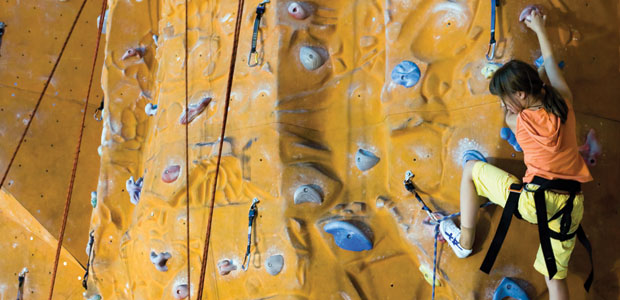
Too much screen time and not enough physical activity is taking its toll on teens and tweens. Do our quick fit exercises with your kids to steer them onto the road to fitness.
The 2012 Active Healthy Kids Canada report states that 63 percent of children’s time after school is spent in sedentary activities. And at lunchtime and after school, kids get 24 minutes of moderate to vigorous exercise out of a possible four hours.
Only 38 percent of parents say they often played active games with their kids in the past year. Through our own lackadaisical attitude about health and fitness we are, inadvertently, leading our own children down the same yellow brick road to Fatland.
The sad truth
In 1981 a typical 12-year-old boy had a body mass index (BMI) of 18.1, and a girl 18.4. Today that same boy and girl are heavier, with BMI measurements of 19.2 and 19.5, respectively.
Statistics Canada also confirms that kids today have poorer grip strength and less flexibility than their counterparts did a decade ago.
Dr. Yoni Freedhoff, a family physician who specializes in bariatric medicine in the Ottawa area, believes that our strongest habits are born in childhood. He believes there’s nothing more valuable to health than fitness. He feels that creating an environment that cultivates activity is one of the most important gifts parents can give to their children.
The Canadian Physical Activity Guidelines reflect the same philosophy. They suggest that children perform at least 60 minutes of moderate to vigorous activity a day, and vigorous to intense exercise at least three days a week. The sad truth, unfortunately, is that less than half of our children meet those requirements. Definitely not what the doctor, or the government, ordered.
Healthy habits
To help your children be healthy and begin a lifetime fitness habit, teach them this fun circuit that they can do on their own. Or, better yet, make it a family affair and perform the exercises together after your evening walk.
With all exercises that involve jumping, ensure your children remember to land on the balls of their feet with their knees bent to absorb shock and avoid possible injury.
Walk the plank
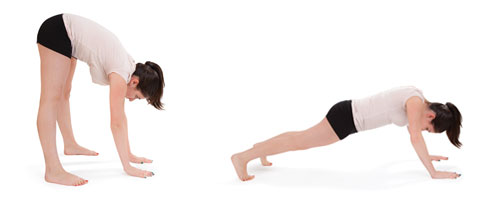
Train your child’s core, while also working on their hamstring and low-back flexibility.
- Standing with feet hip-width apart, keep the legs straight and bend forward, placing both hands on the ground.
- Walk the hands forward until the body is parallel with the ground (what we call in the fitness industry a straight-arm plank).
- Keeping the shoulders, hips, and backs of the ankles in a line, stay in the plank and recite the alphabet to M. Once completed, slowly walk the hands and the body back to an upright position. Try to keep the legs as straight as possible throughout.
- Do another rep and recite the alphabet from N to Z.
- Perform 6 rounds.
Touch the sky
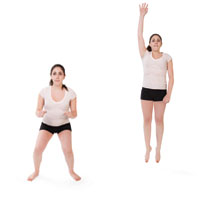
This squat and jumping exercise will work your child’s leg muscles, as well as build their bone density.
- Stand with feet hip-width apart. Pretend to sit down by pushing the bum back as the knees are bent into a squat.
- Quickly come out of the squat and jump up and reach up to the sky with the right hand only.
- Perform 10 jumping squats with the right hand reaching up, and then 10 with the left.
Over and under
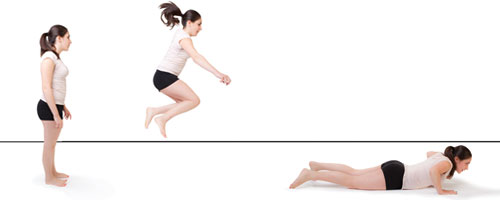
Boost their heart rates with this fun drill.
- Fix a broomstick, or exercise tubing, to two points at the height of your child’s knees.
- Stand with side of body toward the object and jump laterally over the stick or tubing.
- From there, climb under it to get back to the start.
- Continue this over and under pattern for 1 minute.
Crab walk
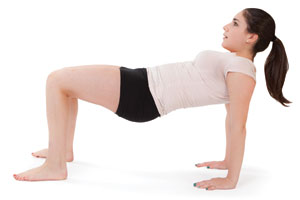
Work your child’s glutes, shoulders, and coordination with this fun exercise.
- Sit on the ground with legs bent and feet flat. Place hands by sides with fingers pointed toward the feet.
- Lift body up into the air and arch the back up as far as possible by squeezing the bum muscles.
- Maintain this position, and begin to step forward with one hand and the opposite leg. Continue this pattern, walking backward.
- Don’t let the bum slump down. When the end of the room is reached, turn around and come back in the opposite direction.
- Perform for 1 minute.
Wooden soldier
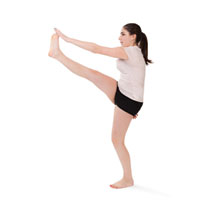
Increase your child’s hamstring flexibility with this exercise.
- Keep the body upright, imagining the posture of a wooden soldier. Swing one leg straight out and swing the opposite arm out at the same time.
- Touch the toe to the opposite hand.
- Continue walking forward, alternating straight legs and hands to touch.
- When you get to the end of the room, turn around and come back.
- Perform for 1 minute.
15 fun family exercise ideas
- Set an example for your kids by being active yourself.
- Play tag, indoors or outdoors.
- Do squats during commercial breaks while watching television.
- Have a sit-up competition.
- Buy a pedometer for each member of the family, and have a daily challenge to see who can take the most steps.
- Visit the zoo, museum, or amusement park to get in plenty of walking.
- Have a hula hoop contest.
- Jump rope.
- Make a pact that for every 10 minutes on the computer everyone has to run up and down the stairs 10 times.
- Volunteer to walk the dogs at your local SPCA.
- Go on a scavenger hunt.
- Have a bike race around the block.
- Choose gifts that make your child move such as balls, bicycles, skates, or kites.
- Present a weekly fitness challenge for the whole family, and post it on the fridge. Some examples include performing 10 jumping jacks every day, doing 10 squats every time you go to sit down, or jumping on one leg for as long as you can.
- Keep a box in the trunk of your car that holds balls, jump ropes, and chalk. That way you will be ready for an afternoon of fitness fun, whenever, and wherever you are.



































